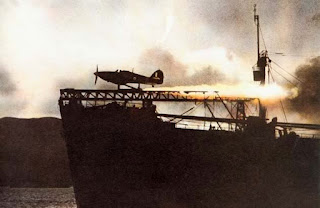Eighty years ago Hitler breaks cover into hubris
Hitler made his first speech since Operation Barbarossa was launched. It was perhaps the high-point of the Third Reich’s triumphalism. He was in confident mood and portrayed the thrust towards Moscow that had been launched a few days before as a decisive step in the defeat of the Soviet Union. He boasted of 2.5m prisoners taken. Curiously he spent more time attacking Churchill, whom he blamed for the war, than Stalin. He did accuse the Soviets of planning an attack but the best he could come up with to present Germany's policy towards the Soviet Union in a favourable light was to assert that no criticism of the Soviet Union had been allowed to appear in German media. He claimed that Germany was strong enough to meet any enemies, a faint warning shot across the bows of the US.
Stalin at a stroke reversed decades of Soviet hostility to religion and declared that there would henceforward be full freedom of worship. In part this aimed a mobilizing the Orthodox church, which had not been suppressed, into support for the war. Perhaps more important, it addressed one of the strongest and most frequently expressed objections expressed against the Soviet regime in the USA, where “godless communism” was almost a stock phrase. The US had not explicitly demanded an easing of rules on religion as a quid pro quo for military supplies, but the point had been raised and publicly reported in the course of negotiations in Moscow.
President Roosevelt took another small but symbolic step towards committing the US to the conflict. He sought Congressional approval for the arming of US merchant ships to defend themselves. The proposal in itself this was unexceptionable; American ships were now being attacked frequently by U Boats and few would argue that they should be left defenceless. The step did, though, involve an amendment of the Neutrality Act, protecting which had become a shibboleth of the isolationists.
The award of a DSO to the pilot of a Hurricane fighter who had shot down a FW200 long range bomber underscored the difficulties the British faced to protect the convoys on which the country’s survival depended. The shortage of aircraft carriers exposed merchant shipping to air attack and the British had adopted the desperate expedient of the Catapult-Armed Merchant ship, which launched fighters by rocket on one-way missions to attack bombers; out of range of land, the pilot’s only means of survival was to ditch next to an escort vessel. At 40 RNVR Lieutenant Robert Everett was old to fly fighters but he had ridden winners in both the British and Irish Grand Nationals.
The House of Commons was enlivened by an acrimonious debate over the government’s refusal to grant exemption from military service to a number of “Oxford Group” evangelical lay preachers. The Oxford Group or Moral Rearmament as it was also known had been a significant force in promoting appeasement. But for the House’s instinctive enthusiasm for any point on which to niggle at the government’s quasi-dictatorial behaviour it is unlikely that there would have been much interest in the question. Otherwise, the best argument that could be found to advance in the Group’s favour was its high standing in the US. The Group was assailed by the humourist A. P. Herbert who sat as MP for Oxford University and had always been deeply critical of the group’s unspoken attempt to pass itself off as part of the university.



Comments
Post a Comment